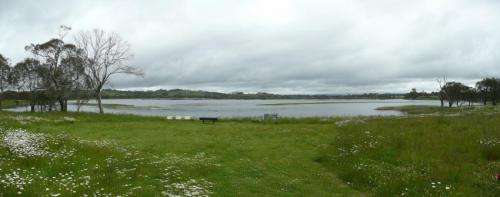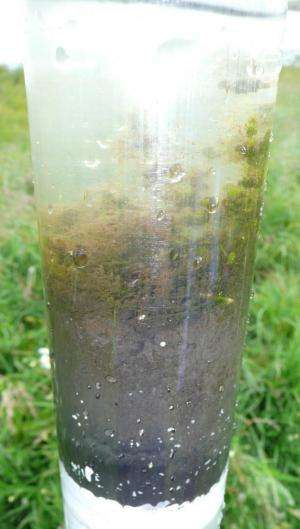November 14, 2014 report
Study shows removal of trees makes wetlands wetter

Bob Yirka
news contributor

(Phys.org) —A small team of Australian researchers has found that cutting down trees in a wetland area, tends to make the area even wetter. In their paper published in the journal Science, the team describes a study they undertook analyzing wetlands in Australia and historical records from other sites around the world to come to their conclusions.
The modern mantra has always been that cutting down large numbers of trees is always bad for the environment—doing so means less carbon dioxide is taken out of the atmosphere, contributing to global warming, etc., and planting new ones to replace those that were lost is always a good thing. In this new study, the team in Australia argues that cutting down trees, such as was done in the Northern Tablelands in the New England region of New South Wales Australia, in the mid 1800's, led to what is now Little Llangothlin Lagoon, a protected water body that hosts a wide variety of plant and animals that are now dependant on the wetland ecosystem. Research there by the team uncovered artifacts that suggest that before people arrived on the scene, there wasn't a lake at all, in fact, it was more like what the team calls a swamp that was wet only during certain periods of heavy rainfall.
Wetlands grow wetter when trees are removed, the team claims, because trees pull water out of the ground via their roots, a large amount of which winds up in the atmosphere after being emitted from the leaves. After analyzing data generated by other researchers over time of 317 other wetland areas across the globe, the team has calculated that approximately 10 percent of them have been made wetter by deforestation.
The researchers suggest their findings should be taken into account by land managers—trying to replace trees in wetlands, could they say, reduce water amounts and disrupt sensitive systems that have evolved to take advantage of the changed landscape. Planting trees, they add, could wind up in a loss of rare plant or animal species. They add that their analyses revealed that tree cutting in the areas studied resulted in what would have happened had there been a 15 percent increase in rainfall. They suggest that further studies be done and that changes in water amounts be taken into consideration by land managers when making decisions.

Written for you by our author Bob Yirka—this article is the result of careful human work. We rely on readers like you to keep independent science journalism alive. If this reporting matters to you, please consider a donation (especially monthly). You'll get an ad-free account as a thank-you.
Publication details
The hydrological legacy of deforestation on global wetlands, Science 14 November 2014: Vol. 346 no. 6211 pp. 844-847 DOI: 10.1126/science.1260510
Abstract
Increased catchment erosion and nutrient loading are commonly recognized impacts of deforestation on global wetlands. In contrast, an increase in water availability in deforested catchments is well known in modern studies but is rarely considered when evaluating past human impacts. We used a Budyko water balance approach, a meta-analysis of global wetland response to deforestation, and paleoecological studies from Australasia to explore this issue. After complete deforestation, we demonstrated that water available to wetlands increases by up to 15% of annual precipitation. This can convert ephemeral swamps to permanent lakes or even create new wetlands. This effect is globally significant, with 9 to 12% of wetlands affected, including 20 to 40% of Ramsar wetlands, but is widely unrecognized because human impact studies rarely test for it.
Journal information: Science
© 2014 Phys.org





















